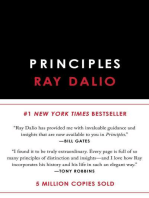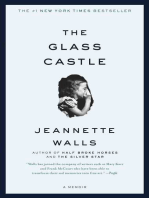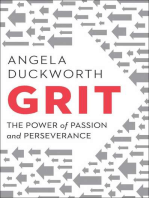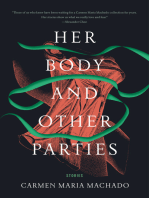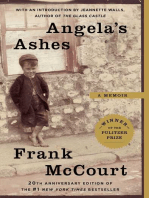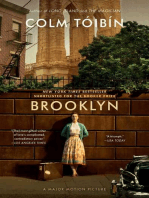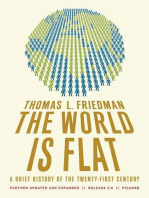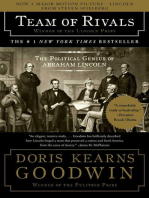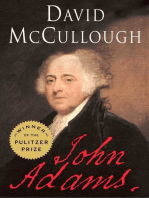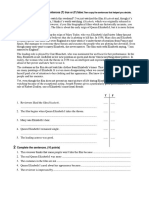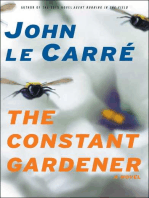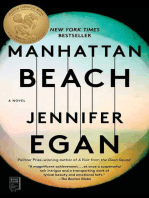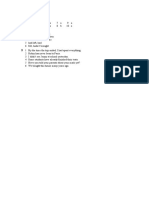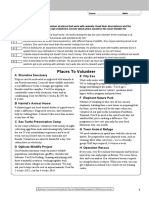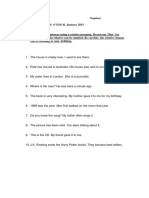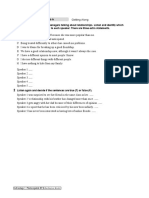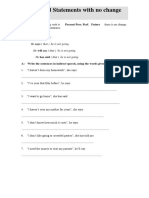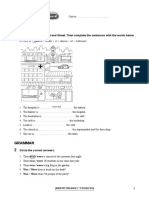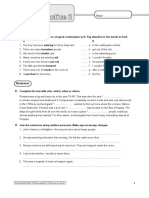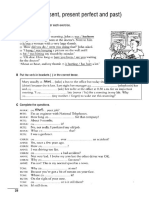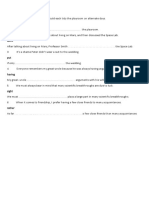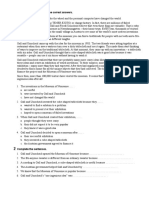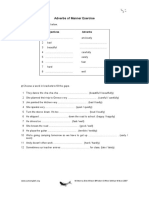Professional Documents
Culture Documents
Timesaver Visual Grammar PDF
Timesaver Visual Grammar PDF
Uploaded by
Anonymous JsgoHdcd100%(2)100% found this document useful (2 votes)
185 views81 pagesOriginal Title
Timesaver_Visual_Grammar.pdf
Copyright
© © All Rights Reserved
Available Formats
PDF or read online from Scribd
Share this document
Did you find this document useful?
Is this content inappropriate?
Report this DocumentCopyright:
© All Rights Reserved
Available Formats
Download as PDF or read online from Scribd
Download as pdf
100%(2)100% found this document useful (2 votes)
185 views81 pagesTimesaver Visual Grammar PDF
Timesaver Visual Grammar PDF
Uploaded by
Anonymous JsgoHdcdCopyright:
© All Rights Reserved
Available Formats
Download as PDF or read online from Scribd
Download as pdf
You are on page 1of 81
Timesaver photocopiabie| |.
. Timesaver
Visual Grammar
(Elementary — Intermediate)
Mark Fletcher
and Richard Munns
MSCHOLASTIC MARY GLASGOW MAGAZINES
Contents
& Elementary (students with up to 2 years of English)
co Boas
be and have Present simple: be and have 6
90 and lke Present simple: go ane ike 8
Moody Mick's day Present simple for routines 10
What have they got? Have got 2
Busy being busy Present continuous 4
Usually but. Present simple and present continuous 6
types Harrys holiday Past simple regular verbs s
Dizzy Daisy's day out Past simple: iregular verbs 20
World traveller Future with will 2
After work Future with going to 24
Elementary tense review Review: present simple, present continuous, past simple, going to 26
«x Pre-intermediate (students with 2-3 years of English)
They've just Present perfect 28
Already, yet, for, since Present perfect with already, yet, for, since 30
‘Then and now Present perfect and past simple R
What were they doing? Past simple and past continuous 34
Is there anyone there? a lot of, (not) much / many, (not) any 36
Four friends Comparatives and superlatives 38
What are they saying? will (spontaneous decisions) and going to (plans) 40
Groovy Granny's trip to Scotland First conditional a
Eventful histories Present and past passive 44
Pre-intermediate tense review Review. present simple / continuous / perfect, past simple / continuous,
Present / past passive 46
atta at
ooo
dei Intermediate (students with 3 or more years of English)
con Sa
Mow lng? How many? present perfec simple and continuous *
if} wasa im ste Second conditional 0
Wy they doe Past erect and pst simple 2
I they hadnt Third conditional 5
Lite in 20s Fut perfec and might have ss
Loaded Uamis new house 1 Fasives present contnvaus (and present and past spe) se
Loaded amis new house 2 Passive: present perfec (nd present and pt simple) %
Comping passives Pasives all tenses 2
Scemny Grace and Grandad Graham used to a
What has happened? rst an shout have 6
Intermediate tense review Review clung past perfec, present prec continuous future perfect 68.
aa
a a a a
|
Introduction
Timesaver Visual Grammar is a rich resource of lively,
photocopiable grammar practice materials for
secondary school students at Elementary, Pre-
Intermediate and Intermediate levels. The easy-to-use
format and answer key saves preparation time and
forms an ideal bank of materials to supplement any
coursebook.
Each activity provides thorough and stimulating
practice of the main structures found in a syllabus
spanning Elementary to Intermediate levels. Through 2
series of fun and memorable cartoons, students are
prompted to produce and practise grammar in context.
Humorous teen-friendly characters such as Clubbing
Clare and Dizzy Daisy will contribute to students’
motivation and enjoyment.
How to use Timesaver Visual Grammar
The activities are divided into two-page sections. The
first page always contains a set of picture prompts
focusing on production of the target structure. The
second page provides further contextualised practice
through a variety of exercises - dialogue completion,
matching exercises and so on. There is a tense review at
the end of each level to consolidate the key structures
taught.
The Visual Grammar activities are not intended to
present new grammar but to provide practice of
recently acquired structures. For this reason, there are
‘no grammar explanations.
Page 1: The first-page section of each activity can be
used in isolation, as well as with the accompanying
second page. For example, try using it as a warmer at
the start of a class, before using the coursebook
Students look at the picture prompts and orally, either
in pairs or as a class, produce the correct sentences, Use.
this as an opportunity to work on pronunciation and
contractions, where necessary.
Alternatively the first page can be used as a revision tool
to jog students’ memories before presenting a new
related structure. For example, you might want to
consolidate students’ knowledge of simple past tense
form and usage before presenting the present perfect for
the first time.
With stronger classes, you may even want to use the
first section as a means of ‘test - teach ~ test’ type
presentation: students complete the exercises in written
form and try to produce the new structure. You then
present the new structure, eliciting form and usage as.
far as possible from the class, before going on to
practise the new structure further,
Page 2: The second-page section of each activity works
best as a follow-up to the visual prompts. Once students
have revised the structure, the second section gives
them the opportunity to practise grammar in context
through a range of exercises - question and negative
formation, matching activities, dialogue completion and
freer personalisation activities.
The emphasis is on written production but there is
plenty of opportunity for oral practice too. Get students
to act out the dialogues they have completed in pairs
or in front of the class, for example. When completing
2 personalisation activity, ask students to compare their
experiences with their classmates.
Time: Approximate timings are indicated at the top of
each activity and are based on working through all
exercises. However, as has been shown, the material is
designed to be flexible. f you have a whole 40- or S0-
‘minute class to fill, there is plenty of scope for
extending the activities using the suggestions above.
Alternatively, the first-page section need only take a
maximum of ten minutes as a warmer before the main
focus ofthe class begins.
Level: This generally corresponds to the structures that
most students who have studied for a particular length
of time can be expected to have covered:
+ = up to 2 years of English
x = 2 to 3 years of English
oie = 3 years or more of English
The levels are not in any way prescriptive. Students of
higher levels may need to revisit lower level structures,
or stronger students with fewer years of English may
need a higher level of challenge. All depends on
individual classes.
EAE Present simple: be and have
be and have
1 complete the sentences with the correct form of be or have.
We good
swimmers.
They
very sad.
(a ic sa sn aS RENE TTI REATEME)
We HAVE. uu. t00
much homework.
You
beautiful eyes.
She
spaghetti for lunch
every day.
1 alot
of money.
They . a
nice house,
POW PDR MDT PPT Pa ar rm Pr i a re eee
TTC cnc
2 complete the questions and answers.
have
2am She tall? 6 too much homework?
Ye5, she nlf
you tired? beautiful eyes?
Yes, she
he your brother? roast beef every day?
No, she
a lot of money?
Yes, |
10 a horrible house?
No, they
z ZAI
g
es
be have
4 You ....Aremt.. very tal. 6 We....dan't. have... too much homework.
21 very tired 7 You beautiful eyes.
3 He my friend, 8 She spaghetti every day
We scons §o0d Swimmers 91 a lot of money.
5 They very sad 10 They... anice house.
(Ce WS URNS aR CARON HEN ROA OESEOUSTE NED
CAE se snp: 90 ot ike
go and like
1 complete the sentences with the correct form of go or like.
DBA
J] the cinema every
Po Buns tO WORK
at 8 o'clock.
You always
too fast.
My brother
to schoo!
by bike.
They on
holiday three times a
year.
We to
Friday.
Valle,
dancing,
You.
strange music.
She
reading,
We the
same things.
They all.
tea,
DDD DPMP PRR PPE PPR eee era ae
sierra
NEA resent simple: 90 and me DD
2 complete the questions and answers.
like
YOU oe AQ none tO Work at the same tiMe — 6 ve 2Qrcnouie YOU snl KE unm dancing?
every day? YE5, boon
Yes, 1.0. he normal music?
they always too fast? No, he
Yes, they : reading?
your brother to school by bus? Yes, she
No, he different
they on alot of holidays? things?
Yes, they No, we
swimming every Friday? 10 they all
No, we No, they
3 complete the texts with the correct form of the verbs in brackets.
We (1 not like) 421i. like... most of the restaurants in our
town, but we (2 like) a pizza restaurant called
Pizza Pizzazz, We always (3 go) there on
Saturdays. We (4 like) the waiter at the
restaurant, and he (5 like) us too,
But sometimes we (6 not go) home until
midnight, and he (7 not like) us then.
He (8 not like) working late at night.
Rosie (9 G0) +. w» to school by bus. The bus (10 go)
along her street and straight to school, so
it's a very easy journey. But Rosie (11 not like).
getting up in the mornings. She (12 like)
Iying in bed. Sometimes she's too late for the bus,
0 she (13 go) to school in her parents’
car Her parents (14 not like) taking her
to school, because they (15 go) to work
in a different part of town. Sometimes they are very
cross with Rosie.
Moody Mick’s day
a Look a cat the pic tures, Ask ood answer ques estions.
When does he 1? Where does shee
SO AAA aaa
STITT aM dah da
CETERA Present simple for routines
2 What does Moody Mick do on school days?
Complete the text with the correct farm of these
verbs. You will need to use some of the verbs
more than once.
have get play arrive do
go watch = wakeup — talk
meet leave
(On school days, Moody Mick (1) .WAK¢2,UP.. at 6.30, He (2) ‘awash and (3) dressed,
At 7.30 he (4) breakfast. He usually (5) cornflakes, bread and tea. He (6)
home at 8.15 and (7) woe to school by bike. He usually (8) 0s. at school at 8.45. He (9)...
lessons unti! kinch time. Lunch time at school is from 12.30 to 1.30. In the afternoons he (10) more
lessons or (11) basketball. He normally (12) 7 home at 4.00. He and his parents
(13), dinner at 8.00. In the evenings, Moody Mick (14) his hornework, (15)
TV or (16) friends. They (17) about their plans for the weekend.
3 answer the questions.
4. What time does Moody Mick wake up? He wakes up at 650.
2 Does he have a shower in the morning?
3 What does he usually have for breakfast?
4 How does he go to school?
5 How long does the journey take?
6 Where does he have lunch?
7 When do Mick and his parents have dinner?
4 and you? Answer the questions about your day.
1 What time do you usually wake up?
2) What do you normally have for breakfast? Ls
3 Do you usualy have lunch at home?
4
‘What do you do in the afternoons?
5 write three more questions and interview a friend.
nav Sia GAR © Ha ANCONA, PATO SOTERS GED
What have they got?
1 100k at the pictures and answer the questions.
What's Greedy Greg got for lunch? What family has Dreamy Daphne got?
DOK ORAEERTROKRTPPPTEPPTPR Aer reer eae
cincinnati
qm CQ
2 complete the sentences about Greedy Greg. ay, Un
B He 2.408 acon @ banana in his lunchbox. GEESY
2 He hasn't. got. an apple. | 26
3 He . some crisps
4 He any biscuits.
5 He any orange juice.
6 He _ some lemonade.
3 complete the conversation between Hectic
Harriet and her work colleague, Lazy Lucy. Use
the correct form of have got.
Lazy Lucy: (1) ... Have YOU. GOE.... any appointments today?
) Z y)) @ lunch with the Finance
Director. But | (3) any
meetings in the afternoon,
Lazy Lucy: Do you want to come for a drink after work?
Hectic Harriet: Sorry. (4) time to come.
145) too much work.
4 answer the questions.
1 Has Dreamy Daphne got a brother? Yes, She. Nas
2. How many cousins has she got? She six cousins
3 Has she got a cat?
4 And you? What family (and other
animals!) have you got?
7] 5 complete the questions and answers.
2 1. How many bottles ....14S,
Dodgy Dan got. ?
7 2 . anything dangerous?
er 3 anything to read?
4 And you? What have you got in your bag?
EAI 20 continvous a o>
Busy being busy
1 Look at the pictures. What are the people doing?
Pa A a
Sere eerie eee eee re IriH
2 Describe the pictures in exercise 1 using these verbs.
You don’t need to use four of the verbs.
climb cry drive sing cook eat play get on
sleep paint wash drink shout wateh swim listen
run shop dance ride write read get off talk
Picture
1 He’s.watching Tv. 1"
3 raw your own pictures for t!
w
jour verbs that you didn’t use in exercise 2.
sentences.
4 Ask and answer about the pictures in exercise 1.
eg.
What's he doing in picture 18?"
‘He's singing.
‘Is she riding a horse in picture 3?”
‘No, she isn’t. She's riding a bike.”
(a AL NAR HY ASCH Aa OTERO ED
(QUIETER ser se and present continuous o>
Usually, but ...
T Look at the pictures and answer the questions.
What do they do on ordinary days?
O77)
ae
HABE!
Cer
PRR wR a a
Dg) fd! at da) a) aa)
,
Seer eee rr arr
ple and present continuous 8 @®
2 complete the texts with the nouns on the left, and with the verbs on the right in the
correct form. You will need to use some of the verbs more than once.
do fight work drive look look after
have wear shop help study sit travel
student firefighter
farmer film star
play read act dive
Fearless Freddie is a (1) firefighter. He usually (2) ...WEAP%......a uniform.
He (3) a fire engine. He (4) fires and
6) people in danger. But at the moment he (6) /en't.fighting ~ IRE
fires. He (7) his uniform. What (8) ...2.6.42iN4...... ? He =
@) by a swimming pool and he (10) a
drink. He (11) swimming trunks.
Slender Glenda is a (1) ‘She usually (2)
glamorous clothes and lots of make up. She (3) in films
and she (4) all over the world. But at the moment she
(5) ‘What (6) ?She
” golf. She (8) shorts and a t-shirt.
Chilled-out Charlie is a (1) He (2) at school five &
days a week. He (3) a UniforI. He (4) sons lessons
from 9am until 4pm. He (5) a lot of books. Is he at school at the
moment? No, and he (6) his uniform. He (7) I)
jean anda tshirt. He for computer goresin ihe hgh treet. (J
Ta Hippy Holly i a (1) she (2) on a farm, She
AN G3) a tractor and (4) her sheep.
; She usually (5) boots and a warm hat. But what
(6) at the moment? A wetsuit. What (7) oo ?
ha ‘She (8) in the sea and she (9) at the fish.
3 ana you?
What do you do on ordinary days? What are you doing at the moment?
1 au
2 5
3 6
ance oc SHAT
LATTE ?: sinpe:requiarveros o>
Hyper Harry’s holiday
1 Look at the pictures. What did Hyper Harry do on holiday?
aad
recs
relax / beach dance / all night 7 travel / home /
disco train
PSY TAY a ee
ar eg ag a a
| IEREIITIA 2: irte:egtr vers
__92@
2 complete the sentences about Hyper Harry's holiday.
Use the past simple, positive or negative, of these verbs.
cook play travel
1 Hyper Harty oon SFAVEM ue ata campsite on
sunday and Monday. 6 He
2 he ... didn’, 2tAY.... at the campsite all week, 7 He
3 On Sunday he his dinner ona fire. 8 He
an all day on Monday. 9 He
5 He to town on Monday. 10 He
relax stay dance pack up walk
his tent on Tuesday.
basketball on Wednesday
on the beach on Thursday
all Saturday night at a disco.
. home by plane on Sunday.
3. Ask and answer questions about Hyper Harry's holiday.
‘What did he do on Wednesday?’ ‘He played tennia’
‘Did he stay at the campsite on Tuesday?’ ‘No, he didn’t.’
4 and you? Write three things that you did on your last holiday.
CoRR ant OH GERRI T
TTI 2 sre ieveguar vores -
Dizzy Daisy’s day out
1 Look at the pictures. What did Dizzy Daisy do last Saturday?
Gain) (8a J|——}
aU F 2
APUG TY eae ge et peat
——— TCC icici iin
2 Are these sentences about Dizzy Daisy's day out true (T) or false (F)?
1 She drove all the way to London 1©) 4 they bought ait of things in Oxford Street. T/F
2 she met a friend atthe station TIF 5 They went sightseeing TF
3 They had lunch at an italian restaurant. —-«T/F_—_ 6 twas dark when she got home ue
3 write six more sentences about Dizzy Daisy's day out.
Ask a friend if they are true or false.
4 write questions for Dizzy Daisy about her day out. Use these verbs.
1 drive Did you, drive all the way te London?
2 read What. did you
3 see
4 meet
5 eat
6 wy
790
8 oet
9 buy
10 lose
5 in pairs, roleplay a conversation
between Dizzy Daisy and a nosy
neighbour about her visit to London.
Use some of your questions from
exercise 4,
I 0 ww @>
World traveller
1 Next year Restless Rachel will travel around the world. Look at the pictures and make
sentences. Use these words and phrases.
the Great Wall the Great Pyramids the Taj Mahal Tower Bridge the Himalayas
lions dolphins kangaroos igloos amusieal modern art a carnival
eg. In January she'll go to the ce a musical.
SS Tea ae ay ae ae
eee ere ree eee eee eco eeeere eter tt IA ta
AI ore wir wit o>
2 complete the interview with Restless Rachel.
January —_..Where.will.you.be.in.January?.... @ ill be in the USA,
February will you see lions in February? © No.!.won't. Sl 2¢e.a carnival.
March March? © I'll see dolphins.
April What will you do in Australia? °
May eee © No, Wl be in China.
June © lclimb a mountain.
July © Meat
‘August How will you travel in Kenya? °
September © No, Wl travel by camel
October vennvnnnnnninnnnnn ~. © Ill vsit the Guggenheim Museum
November © No, "be in England
December Where will you meet Inuit people? ©
33 write five negative sentences about Restless Rachel.
1 She.won't meet. Inuit. people in India,
weun
(CR a SR SNORT ARTO ART NTO TOTES ED
CiesAvce VSLAL GRAN eee _ @
After work
1 Handy Andy and Funky Fiona are at work at the moment.
What are they going to do tonight?
AR A A TY TTT itty
See eee eee eee eee ee Iie
CEE F101 wit going to oe € >
2 Read the text and look again at the pictures in exercise 1.
‘Answer the questions.
Handy Andy works in a garage. He's a mechanic. He's repairing a car at the moment and he’s thinking
about tonight. Tonight's a special night, because he’s going on a date with Funky Fiona.
1 What time is he going to finish work?.... He's. ging. to. finish work at. 6.00.
2 What's he going to do after that?
3. When is he going to drive to town?
4 What's going to happen at 7.307
5 What are they going to do at 8.007
3 write three questions and answers about Funky Fiona’s plans for tonight.
1Q sronnnnnnnninnnnnninnnn? AL
2Q 2A
3Q 2A
4 complete the conversation between Handy Andy and Clumsy Chris,
another mechanic at the garage.
Clumsy Chris (1)
Handy Andy I'm going to wear my cool new jeans.
Clumsy Chris (2)
Handy Andy First we're going to have dinner in an expensive restaurant.
Clumsy Chris (3)
Handy Andy I'm not sure. Maybe cocktails and a bottle of wine.
Clumsy Chris (4)
Handy Andy No, we aren't. We're going to go to a club after dinner.
Clumsy Chris (5)
Handy Andy At the moment? She's in the bank. That's where she works.
Clumsy Chris (6)
Handy Andy At 7.30.
EAI view: presen sie, present continuous, past simple, going to o>
Elementary tense review
Match the pictures (1-8) with the sentences (a-h).
Salty Sue
a) Last weekend I sold a lot of fish ©) | sell fish at the harbour.
1b) I'm going to sell a lot of fish to the tourists. ) I'm selling some fish at the moment.
Dashing Dave
e) He's playing computer games at the moment, 9) He's going to play in Russia next week.
) He plays football every Saturday. Ih) He played in the Cup Final last year.
GBB
NV |
Seer cee ee rt Ir
(TAI: resent simple, present continuous, pst simple, going to 62>
Interviewer
Salty Sue
Interviewer
Salty Sue
Interviewer
Salty Sue
2 complete the interview with Salty Sue.
a a
I sell fish at the harbour.
Is business good?
well, 1 (2) a lot last weekend, but | didn’t
a) much yesterday,
4) 7 os z
This afternoon? | hope I'm going to sell a lot more fish!
3 answer the questions about Dashing Dave.
1 Ishe playing football at the moment?
No..He.
2 Did he play in the Cup Final last year?
3 Does he often play football?
4 What's he going to de next week?
Interviewer
Dashing Dave
Interviewer
Dashing Dave
Interviewer
Dashing Dave
Interviewer
Dashing Dave
4 write questions for Dashing Dave.
a
Yes. | play every Saturday.
@
Yes, | did ~ and we won!
@
Yes. The team is playing very well this season,
“
In Russia,
6 WORT GSEON WAC, RT ROSTER ED
They’ve just ...
1 Look at the pictures. What's just happened?
WY mar an oa moa wom ao
PT TP ae ea a mm
eee eee eerie ieee rT
AIT reer pevect. 63>
2 Look at the pictures in exercise 1 and answer the questions.
Picture
Have they broken the window? _.Y@s,. they. have..
Has she fallen off her bike? No, she, hasn't,
Has he been to the shops?
Have they robbed the bank?
Has he caught a mouse?
Have they just started dinner?
Has she just woken up?
Has the bus left the bus stop?
3. Make sentences about the pictures in exercise 1.
Use the prompts, and positive or negative forms of the present perfect.
Picture
1 break / the door They, haven't. broken the. door.
hurt / her back
have / a swim
steal /a car
drop / the fish
eat /all their food
brush / her hair
evauawn
miss / bus
4 write questions for these answers.
1 What: have. they broken?.
They've broken a window.
2 Where,
He's been to the swimming pool
They've stolen some money.
He's caught a big fish.
Yes, and now they have to do the washing up.
(nT ST RATA CAT BAIR HRA TOUTES ED
TINIE 0 priest with aay, yt for since &@
°
Already, yet, for, since
T Look at the pictures. Make sentences with already or yet and the present perfect.
@.9. She's already bought some sunglaeses.
curmm.-.
2 Look at the pictures. Make sentences with for or since and the
present perfect of these verbs.
EY GGG
Inn
—— oon
(\UEENETIT esen prtec wit acy ye. for since 8®
3 Look at the pictures in exercises 1 and 2. Complete the questions and answers.
1 Hae.she. bought: any: euncream yet?.
No, she's hasn’t. She’s going to buy some later.
No, the passengers haven't got on the bus yet.
3 the grass near the flowers yet?
Yes, her mother’s already cooked a big dinner.
5 How long
They've been married since they were very young.
6 Has she had the car long?
7 sn at the school?
.. Six years old.
8 Has she always drunk a lot of milk?
Yes, «She's ababy. ——
9 on the desert island all his life? S<
No, he He's only lived there
4 and you? Answer the questions.
1 Have you finished this exercise yet?
2 Have you had breakfast yet?
3. How long have you been at your school?
4 Have you always lived in the town where you live now?
5 How fong have you had the shoes that you're wearing?
(| MIINTI space ps sna
Then and now
T match the sentences (a-d) with four of the pictures.
Make sentences for the other pictures.
1a) She's won the tournament, ¢) She
b) He's run 20Km,
the bank for five years.
) He lived in Hong Kong for a lon:
8
LEER RAPP PARP AEP APA Paeea eae
(ING es ptt nd past sine e2>
2 Match the conversations with the pictures from exercise 1.
“How long have you lived in Hong Kong” @) ‘Have you been busy today?”
‘since 1985, "Yes. We've had a lot of customers.’
Picture 5. Picture
“Have you ever won a tennis tournament?" ‘How do you feel about your win?"
“Yes. | won Wimbledon when I was a teenager’ ‘Wve never been so happy in my lift”
Picture Picture
‘How far did you run?” ‘Have you nearly finished the race?"
“Too far!’ ‘Oh no. 've only just started!”
Picture Picture
“Have you ever been to Hong Kong?’ ‘I worked there a few years ago.”
"Yes. I lived there for several years.’ ‘Did you enjoy it?”
Picture Picture
3 and you? Answer the questions.
1. How long have you lived in your house or flat?
2 Have you ever won a competition or tournament?
What did you win? When did you win it?
3 Have you ever been to Hong Kong?
4 Have you been busy so far today?
What have you done?
Ten ra a STAIN TOROS ED
What were they doing?
T Look at the pictures and make sentences.
Use a verb in the past simple and a verb in the past continuous in each sentence.
eg. They were relaxing in the living room when the baby started crying.
PP ar ne ae
pt upto uu aC CC
as simple and past continuous __8®
2 complete the sentences about pictures 1-4 in exercise 1.
Use a verb in the past simple and a verb in the past continuous for each sentence.
Use positive or negative forms.
Picture
1 They (sleep) .... werent sleeping... when the baby (start) started, crying.
2 She (have) an accident while she (cycle) to school.
3 He (do) his English homework when the computer (catch) fire.
4 She (play) with the dog when it (decide) to bite her.
3. write two questions and answers for pictures 5-8 in exercise 1.
Use your imagination for the second answer.
Picture
s What.wae,he doing when the policeman arrived?,
He.was.stealing.a TV. .
What. did he do when the policeman arrived?
He. dropped the TV and.ran away.
6 What.were.they.doing.when. it
They.
What. did they da
They.
alot of, (not) much / many, (not) any
ee >
Is there anyone there?
T Make sentences with a lot of, not much / many or not any.
eg. a) There were a lot of trees.) There weren't many trees,
©) There aren't any trees.
TT
“_1_( Wednesday: Okm/h »-
PSR II Ia
TER ER tte
TP ER tte te er
IF
IF te
(
TITTIES ante et
CAI 210% 0,01) much many, nod any 8 ®
2 complete the questions and answers.
1 Were. there. many.trees.... in 19307
Yes, there were a lot of trees
2 Has the man got much water in the bucket?
on Tuesday.
3. write five more questions and answers
about the pictures in exercise 1.
CATIA 2m atives and superaives >
Four friends
Make sentences comparing the people in the pictures.
T mak paring the people Pi
Use comparatives and superlatives.
oe Be wy a
me CL REY
fe
&
EEPER ETRE TTT TTT PRR PR aa
Soo Cnn
LATA om praves and speratives __ 8®@®
2 Are these sentences comparing Tireless Thomas with his friends true (1) or false (F)?
Snobby Sophie is thinner than Tireless Thomas.
Hassled Hannah has more children than Tireless Thomas. TIF
Rustic Rory has less hair than Tireless Thomas, vWF
2
3
4 Snobby Sophie's home and car are more expensive than Tireless Thomas’. T/ F
5 Hassled Hannah's dog is friendlier than Tireless Thomas's TIF
6
Rustic Rory's dog isn't as big as Tireless Thomas's TIF
3: Write six sentences comparing Rustic Rory with his friends.
‘Ask a partner if they are true or false.
4 Circle the correct alternati
Hassled Hannah ha the least children
Rustic Rory’s dog has the shortest / the longest hair
Snobby Sophie's nose is the most intelligent / the most pointed.
awn
Tireless Thomas is wearing the smartest / the silliest trousers
5 write one more sentence about each friend. Use superlatives.
(Ca a ART ISGOTRTTE A
EAD taneous decisions and going to los) &
What are they saying?
1 what are Becky, Luke and their father saying or thinking?
Match the sentences (a-h) with the gaps.
2a) I'm going to help her with her maths homework tomorrow, e) I'm going to take an umbrella
f) I'm going to make a phone call later. f) Ill get you something to eat
©) Hl answer it. 9) ('Cbelp you if you want.
@) ll take an umbrella, fh) I'm going to cook a big meal tonight.
Charlotte phoned.
She wants you to
bring a calculator.
OK, thanks. =F /)
ST ee a ae a
eee eee eee cee ace eee A AE arte
EAI + 2orcaneous decision) and gong t (oars)
Picture
1
fon phone]
Becky
Becky
Luke
Dad
Becky
shop
assistant
Dad
Luke
Dad
Luke
Becky
Dad
Becky
Luke
Becky
2 These conversations follow the situations in exercise 1.
Complete them with will or going to and the verbs in brackets.
Hi, it's Mike. Is your father there?
Just a minute. | (get) him for you.
I've got to speak to Charlotte before 10. t's really important that | remember.
Don't worry. (not let) you forget.
Do you want a bar of chocolate?
Thanks, Dad, but I'm on a diet. | (not eat) anything between meals
for the next few months.
The olives are half price today. Are you sure you only want one tin?
Half price? OK then, 1 (buy) three
‘Thanks, Dad, but Becky (help) me with it after dinner.
That's kind of her.
(you/ be) at Charlotte's house for long?
No, just for an hour or two,
Its raining really hard now. 1 (drive) you to school today.
Thanks, Dad. | hate walking in the rain.
What (you / do) in Manchester?
Well, Charlotte knows a really good club in the city centre ...
aa \
EEE e000
>
Groovy Granny’s trip to Scotland
1 Groovy Granny wants to go to
Scotland for a holiday. There are a lot of
different ways she can go. Make
sentences.
eg. If she goes by plane, it will take one hour
and it will cost £80,
a
XY 1 hour / £80 y
5 weeks / £17
Ce
wv
KX
LS
=
\ 3 days / £140 y
\(G months /2 new pairs of trainer y~
=)
12 hours / £40
STS ATTA STIS IS SISSY saan ay yn
[cna
CAI 1: conaiona __ 8@
2 complete Groovy Granny's conversation with a travel agent.
Groovy Granny (1) How lona,will.t.take If |.go.by bike?
Travel agent It'll take about five weeks, | think
Groovy Granny (2) .How.much -
Travel agent It'll cost £140
Groovy Granny (3)
Travel agent About £40 for petrol
Groovy Granny (4)
Travel agent if you drive fas, itl take about twelve hours.
Groovy Granny (5)
Travel agent t's along way. | think it take about six months
Groovy Granny (6)
Travel agent it won't cost anything if you hitchhike.
3 what will Groovy Granny need on her journey to Scotland. Write sentences.
Picture
1 She'll need an airline ticket. if she. aoes.by plane.
if. she. oes.by boat,
ouauwn
CIITA ese 2d past passive &>
Eventful histories
1 Tell the three stories in the pictures. Use the present
or past passive of the verbs in the boxes.
The castie (1) ....WAe.BUIIE..... im 1157. 1n $644, it 2) by soldiers and one of the towers
@ It remained in ruins for many centuries, but in 1998 the ruins () seven FOF
1m, The castie (5) ‘and in 2003 it (6) as a hotel. These days it
G) for conferences and trade fairs
Saou
1
TSI IS AAAI AYA SR SA aM ata nan a nn
TT ko ee ee A eek ae a ad
CUEING reer onsomyoe CD
2 complete the interviews. Start the questions with
Interviewer (1) When.was. the castle built?
Hotef Manager In 1157, by King Henry Il of England.
Interviewer 2
Hotel Manager The East Tower? It was destroyed in 1644, during the
Civil War. The castle wasn't restored until we bought
it in 1998,
interviewer 8)
Notel Manager Today itis used as a hotel, and as a venue for
conferences and trade fairs
Interviewer ®
‘Owner of Chic Shirts The cotton for our fabrics is grown in India
Interviewer ©
Owner of Chic Shirts The shirts are made in our factories in many parts
of Asia
Interviewer ©
‘Owner of Chic Shirts They are sold in London, Paris and Milan,
Interviewer ”
‘Museum Director In 1502 - by Leonardo da Viaci.
Interviewer ®
Museum Director One night in 1990. Sn...
Interviewer @
Museum Director _It was damaged when it was cut out of the frame. Pige
I'm not sure if it can be repaired rg
(QLUEATAIEIITIII tee rese spe continous perfec past spl continuous present pt pasive &>
Pre-intermediate tense review
1 Match the pictures of High-flying Flora (1-7) with the sentences (a-g).
a) We're flying over the Andes at
the moment
b) Asan air hostess, | fly all over
the world.
©) Last Tuesday I flew to New York.
) Inthe old days, planes were
usually flown by their inventors
PIAS SSS YN gt Ye yeaa agen a
€) While we were flying to Sydney,
a passenger asked me to marry
him,
#) I've never flown ina hot air
balloon.
9) Our planes are flown by very
experienced pilots.
eee eee eee eee rrr
ZETIA vice presert simple continuous / perc. as simple continuous, present past pasive 63>
2 complete the conversation between High-flying Flora and one of her passengers.
Passenger (1) .. How long. have you been, an air hostess?
High-flying Flora _ I've been an air hostess for five years
Passenger @ = 2
High-flying Flora _| fly all over the world.
Passenger ® : flying?
High-flying Flora _Yes, | love it In fact, go paragliding in my spare time,
Passenger ®
High-flying Flora _No, I've never flown in a hot air balloon. I'd like to try it one day.
But planes are my favourite way of travelling. Lots of funny things happen If you work on
planes. The funniest thing happened last year
Passenger 6 =
High-flying Flora _A passenger proposed to me in the middle of the plane, in front of everyone!
Passenger © sn 2
High-flying Flora _| said | was realy sorry, but / was already married!
Passenger 0 when that happened?
High-flying Flora We were flying to Sydney.
Passenger And (8) at the moment?
High-flying Flora Look out of the window! We're flying over the Andes.
Passenger | don't like looking out of plane windows. | get worried that the plane will crash, especially
when I'm in an old plane. (9) ?
High-flying Flora This plane was built last year. I's very new, and very safe.
Passenger Cl . for?
High-fiying Flora Our planes are flown for ten years. After that we buy new ones.
33 Look back at the conversation in exercise 2. Find examples of these tenses.
1 present simple 5 present perfect
2 present continuous 6 present passive
3 past simple oe os 7 past passive
4 past continuous
47
How long? How many?
T make two sentences for each of these pictures. Use the present perfect continuous in
‘one sentence and the present perfect simple in the other.
e.g. They've been playing football for half an hour
They haven't scored any goals,
Waew wy
SI GY ee
fish catch /fieh
ow
‘9.00 -11.00
ona
fly/in a spaceship travel
zou
See eee rr errr
IAIN Present pertect simple and
2 Look again at pictures 1-4 in exercise 1. Write questions for these answers.
Picture
1 How long have they been playing footkall? 3
Half an hour. ‘Two hours.
How many goals have they scored?
None. Three.
25 minutes. Eight years.
Three million,
Pi
ure
s Have they. been picking... pears?
No, they haven't. They've been pickivid... apples.
Have. they picked...a ot of apples?
Yes,
6 Has it been sunny while he's been fishing?
No, Ite.
any fish?
No, he hasn't
7 all the windows yet?
No,
What ~ow t0 reach the windows?
Aladder.
8 “ for the past two days?
Taking exams,
all of them yet?
She’s got two more exams to do.
Cee a nan TART GOON WRERENEEH
EEA 503 onions
If | was a film star
T imagine you had the jobs in the pictures and make sentences.
Think about these questions:
if you were a ..
where would you live? how would you travel?
what would you wear? —_ what would you need to be good at?
eg. If | wae a fisherman, Id live in a town with a harbour.
Exes
Mw
IN
PPP PNW aww mwa am
) 7
A A
eee eee eee eee eee eee eee eee reece ee tere
2 write sentences in the second conditional.
1 be/ good at acting be /a film star 5 make /lots of money buy / lots of cars
If was good at acting, |'d be.a film star.
2 be/afilm star go /to lots of exciting parties
6 buy / lots of cars need /a big garage
3 live /in a big house in Hollywood
have / a swimming pool 7 not live /in my home town
not see / my friends very often
4 have / a swimming pool
hire / someone to clean it 8 not see /my friends very often get /lonely
you were a fisherman, ski
je? Make sentences.
3 How would these things be useful
film star or safari gui
1 sunglasses
Id. wear sunglasses. if | wae.a film, star and | didn’t want. people. to
recognise, me.
2 a weather forecast,
3 ahot drink
4 a compass
5 binocuiars
6 a bodyguard
(QE: pr rps &
Why did they do it?
1 Make sentences about the pictures.
Use one verb in the past simple and one verb in the past perfect.
eg. He bought a bike because hed failed his driving test six times.
leave / quietly —
steal / jewellery
eS win / £1000 =
paint / best picture
be /very rich-star/in
lots of successful films
TIT IIS IIIT ISSA AINE STIS gE AYN eee
Se ccc
(LEAT °c ad past simpie
______ @@>
2 Look again at the pictures in exercise 1 and complete the questions and answers.
Use the past simple or past perfect.
Picture
4. How many times lad he failed hie driving test, 2
He'd failed i six times.
2 What time ?
She woke up at half past twelve.
3 How much money a
He £1000.
No, they hadn't. They'd forgotten to go.
5 Where - the
jewellery from?
she ssn a shop.
6 sve: POOF?
No, they They were very rich.
3 what happened before the pictures in exercise 17
Write past perfect questions with Why and use your imagination for the answers.
Picture
1 Why.had he failed his driving test six times?,
Because, he hadn't. practised. enough...
2 ..Why.had she been at the clube,
Because her friend had
If they hadn’t ...
1 Make sentences about the pictures. Use the third conditional.
WHY a) aa at aa
SY
Ris. 2 =
Pe
AI 11 onivoo1
2 complete the questions and answers about the pictures in exercise 1.
Picture
1 Would he have failed... the exam if he'd started on time?
No. He a good grade.
Would she have got so wet if the weather forecast?
No, because ‘an umbrella with her.
What ss if they'd seen the warning sign?
They ss the car before it went over the diff.
‘Where would she have gone on Wednesday if well?
to see a ballet.
a Chinese takeaway if he hadn't burned his dinner?
fish
3 And you? What mistakes have you made recently?
Write five sentences about them, using the third conditional.
fl hadn't got up late thie morning, | wouldn't have been late for echool.
SCHOOL,
Seer ee eee Ine
EA 1151 rng ove @
Life in 2015
1 Which of the things in the pictures do you think you
will / won't / might have done by 2015?
eg. | might have passed all my exams.
2 which of the things in the pictures do you think
9 Pi
ill / won't / might have happened by 20157
ring Tower of Pisa won't have fallen down.
RET Ra ee
ETAT 101 pertect anc might have a2®@>
3 complete the interview with Lanky Leo.
Use will / won't | might have + the correct form of the verb in brackets.
Interviewer Can you imagine your life in 20157
What (1 you / do) ..Will you have done. by then, do
you think?
Lanky Leo I'm sure | (2 leave)
school, but I'm not so confident about my exams.
1.8 pass) them al, but
maybe not.
Interviewer (4 you/ get) a 900d
job?
Lanky Leo hope so. And I'm sure i (4 fall)
in love lots of times.
16 get) = married, é
though. I'm not going to think about marriage until I'm a
lot older.
Interviewer What (7 happen)
to the world climate by 2015, do you think?
Lanky Leo Temperatures (8 increase) aaa
a lot by then ~| don’t think anyone really knows. But |
don’t think the world (9 change)
very much by 2015, Most of the world's
problems will be the same ones that we have today.
4 think of six more things that will / won't / might have happened by 2015.
Write three sentences about you and three sentences about world events.
as Wnt Gaiman oRaRTaLRCENT MRE RAT OREN ED
Sri
| EAINE #.:peosn continvus nd presen and as sine) &
Loaded Liam’s new house 1
Loaded Liam has bought a
new hause. He has asked a
building company to turn it
into the house of his
dreams.
1 what is being done at the moment?
Make sentences in the present continuous passive, using the words in the boxes.
eg. The roof i being repaired.
thereof the grass a garage take away dig paint cut
the rubbish the gate furniture deliver plant build repair
a swimming poo! flowers atree the fence replace cut down
QV 00) gg) dn ais as a aa en
TOPO ee TTT TPP tera ee
conn
st al Q@
2 complete the sentences.
Use the passive: present simple, present continuous or past simple.
The house Was. bought. ‘two months ago,
The builders last month,
Alot of work 6on the house at the moment.
The builders ‘one hour off for lunch each day.
Lunch between 12 and 1 o'clock
pay Loaded Liam is lawyer, and he ‘much more than the builders.
consider At the moment he for a promotion, so soon his salary could be
‘even higher.
3 complete the conversation between Loaded Liam and the boss of the building company.
Use passives of the verbs in brackets: present simple, present continuous or past simple.
Loaded Liam So what (1 do) ./g, being. done, on the house today?
‘The gardening team is very busy. That tree near the house (2 cut down)
Loaded Liam | thought that (3 do) yesterday!
Builder ‘Well, it (4 start) yesterday, but it's a very long job because the trunk is
s0 thick,
‘What about the bedrooms? (5 they / paint) now?
Yes, and the living room. The dining room (6 finish) ‘two days ago.
That's good. And how much more work is there to do on the swimming pool?
The hole (7 dig) today, but there's a lot of other work to do after that.
Swimming pools always take a long time, I'm afraid. When the hole is finished, everything
(8 make) waterproof. Then the tiles (9 stick down)
It can take weeks.
oD
When Loaded Liam bought a new house
recently, he asked a building company to
turn it into the house of his dreams.
the builders have now finished. What work has been done?
Make sentences in the present perfect passive, using the words in the boxes.
e.g. The roof has been repaired.
thereef the grass the rubbish repair take away cut
agarage flowers atree the fence plant build replace
a owimming pool cut down dig
et
ccna
(QUEENA sive: present pert and present and pst simple) ea®>
2 complete the conversation between Loaded Liam and
friend, Wealthy Will.
Use passives of the verbs in brackets: present simple, present perfect or past simple.
Wealthy Wil
Loaded Liam
Wealthy will
Loaded Liam
Wealthy will
Loaded Liam
Wealthy Wi
Loaded Liam
Wealthy will
Loaded Liam
oO
Have the builders finished the work on your house yet?
Yes, all the building work (1 finish) .fiae.been finlghed.... and the garden is looking great.
What (2 do) in the garden?
There are some lovely flowers there now, and the tree that was growing too close to the house
@ cut down)
‘And what about the swimming pool?
The tiles (4 stick on) last week, so it’ finally ready for people to
swim init
Git/ use) yet?
Not yet. Why don't you come round for a swim this afternoon?
I'd love to, Thanks. And can I see your new garage, too?
Yes, but you can't park your car in it. My Porsche (6 always / keep)
in there.
3. And your house / schoot / town? What changes have been made recently?
Write four sentences in the present perfect passive.
e.g. My bedroom has been painted blue.
(atv wu aR NaN GOETHE MONT OTIS ED
ETE 0 st oe >
Comparing passives
1 make sentences about the pictures using the verbs in the box.
eg. The sheep are going to be sold at the market.
Is being looked after avregeing-te-be-sold wasmade are mined
hasn't been finished will be served
G way a
eT Ye ae
7————oOOOCC CCAir
INIT sve: at terses a>
2 complete the questions and answers about the pictures in exer
Picture
1 Where have the sheep been put?
They've. been put.onto the farmer‘e truck.
What's happening to the sheep now?
What is going to happen to them?
2 When.was.the.first. diamond. found.on. Orange Mountain
The first diamond was found on Orange Mountain in 1830.
Itwas used to make a ring.
‘About $3.5 million of diamonds are mined each year.
3 When was Building A finished?
Why isn’t anyone living in Building B?
Where is Building C going to be built?
It was made in 1805.
It’s being taken to the antique restorer.
It’s going to be mended.
5. What preparations are being made for dinner?
Has the fire been lit yet?
Who has been invited to dinner?
A quclist called Mike has been hurt.
Yes, he is. He's being looked after by a doctor who came in an ambulance.
He'll be taken to the nearest hospital
ise 1. Use passive forms.
CAT e010 eo >)
Granny Grace and Grandad Graham
T Granny Grace and Grandad Graham
live quietly in the countryside now.
Sometimes they like to look at their
photo album and remember how their
lives used to be. Make sentences with
used to.
eg. Granny Grace used to go fer a walk
in the park on Sundays.
Ne NTT TAT aha aya ae
ae ae ar a a a a a a a a a a a a a a a
CAE «0 a®@>
2 Read and complete the text. Use used to and the verbs in the box.
walle live wear be work buy start go love sell
Granny Grace came from a wealthy family. On Sunday afternoons they (1) Used f2.walk. in the park
Clothes were different then. Men always (2) hats when they went out. Every summer
her family (3) to the seaside on holiday. She (4) going to
‘the beach. Some of her happiest memories are of those family holidays.
Grandad Graham (5) in the East End of London. He's a gentle old man now, but when
he was a boy he (6) “ a keen boxer. As a teenager, he had a motorbike and he
o it very fast.
Granny Grace (8) ‘as a waitress, and Grandad Graham (3)
vegetables at the market. it wasn’t an easy life because he (10) his working day at 4am
and finish at 8pm! Granny Grace (11) her food at his market stall. Gradually they got to
know each other and fell in love.
3 complete the sentences about Granny Grace and Grandad Graham.
Use used to or didn’t use to.
1 enjoy she .used. to enjoy. her summer holidays
She a job in a café.
She vegetables at the supermarket.
He with other children when he was a child
He in the countryside in those days
together at the market.
4 and you? Write three sentences about things you used to do as a child
that you don’t do now.
1
2 os
3
Now write three sentences about things you didn’t use to do as a child that you do now.
4
5
6.
a 5
RN 1c shout ave >
What has happened?
T Look at the pictures. What do you think has happened?
What should the people have done differently?
Make two sentences, the first with must have and the second with should(n’t) have.
eg. They must have forgotten to reserve a table.
They should have phoned the restaurant before they left: home.
7
B rma (Be
~
I'm sorry, sir, but
we're very busy tonight.
REPL PRP TPP eee eee eee ae
CCC nna aaa
|
EE 11001 touts hve a2
2 complete the sentences about the pictures in exercise 1.
Use must have, can’t have or should have and the correct form of the verbs in brackets.
Picture
1 They ..can’t have. known....... (know) that the restaurant was so popular.
2 He suns ($68) the danger sign before he went on the ice
3 She : (study) harder for her exams.
4 He (forget) to buy petrol at the last petrol station that he passed.
5 The 8.30 train (be) late,
6 The cars (drive) more carefully in the fog.
7 They (miss) the goal, because they look happy.
8 The woman... (want) the fish for her supper.
3 complete the conversation between Clubbing Clare and her mum. Use must have,
can’t have or should(n’t) have and the correct form of the verbs in brackets.
—=al
ory
Mum Where have you been all this time? I've been so worried
Clubbing Clare You (1 worry) shouldn't. have worried... Mum. We were at the new club in town. it was
fantastic!
Mum Well, you (2 phone) me to tell me where you were.
Clubbing Clare 1 know, I'm sorry, but I didn’t have my mobile with me. | (2 ‘eave).... it
in my bedroom.
Mum You (4 leave) it there. I tidied your room this evening, and I didn't
see it. And anyway, you (5 borrow) a mobile from a friend at the
Club so you could phone me.
Clubbing Clare OK, | will do next time.
Mum ‘And you (6 stay) out so late. It’s three in the morning, and you've got
school tomorrow!
Clubbing Clare Three o'clock? Are you sure? We (7 wait) = ‘a very fong time for the
taxi, because we left the club at one.
Mum Do you think I'm stupid? It (8 take) sennnn sven YOU tWO hours to get home from
the club. It's only ten minutes’ walk away
(QUAINT eviews incising post pertec. present perfec continuous, future perfect
Intermediate tense review
T mateh the
pictures of
Zippy Zoe (1-10)
with the
sentences (a-j).
a) I've been driving since 1990.
b) While | was driving down the
motorway last week, a wheel
came off,
©) I drive a typical London taxi.
) I've driven some famous people
around London,
@) I drove a tractor on my uncle's
farm when | was a teenager.
I'm driving over the River
‘Thames at the moment.
g) I'm going to drive to Heathrow
Airport this evening.
1h) By the time I finish tonight, 1
have driven about 400
kilometres.
1) Last year | got a fine from the
police. 'd driven straight past a
red traffic ight by mistake.
3) Il drive you to the station as
uickly as | can,
99
Tm late for|
my train,
&
TT ee
eee eee eee eer
(ELI view: incising past petect, present perfect continuous, future perfect ea®
2 complete the conversation between Zippy Zoe and one of her passengers.
Passenger (1 like) .20.you ike, your job?
Zippy Zoe Oh yes, | love it.
Passenger How long (2 drive) taxis?
Zippy Zee At the end of next month (3 be)
a taxi driver for ten years, but I've been driving cars
since 1980. Before that, | drove a tractor.
Passenger Where (4 do) that?
Zippy Zoe On my uncle's farm
Passenger (5 have) any accidents since you started driving?
Zippy Zoe I've never had a bad accident, but last week a wheel came off my taxi
Passenger Where (6 go) when that happened?
Zippy Zoe | was driving down the motorway. Luckily the road was very empty, so | didn’t hit anyone.
Before that, | hadn't realised that a wheel could come off a car so easily.
Passenger (7 notice) eons anything strange about the wheel before it fell of?
Zippy Zoe No, not really. It was a complete surprise.
Passenger (8 check) the wheels more often in future?
Zippy Zoe Yes, I'm definitely going to be more careful. I'm feeling quite nervous about car safety at the moment.
Passenger Oh, we (9 get) quite near my house now. That's it, just there on the left.
Zippy Zoe OK, (10 park) as near to it as can.
e 2.
3 Look back at the conversation in exer ind examples of these tenses.
1 present simple 6 present perfect simple
2 present continuous 7 present perfect continuous
3 past simple 8 future with going to
4 past continuous 9 future with will
5 past perfect 10 future perfect
ES 9)
Answers
a a a a A a a A A A A a
Answers
Pages 6 &7
be and have
1 1.are, 2. am, 3.is, 4. are, 5. are, 6. have, 7. have,
8. has, 9. have, 10. have
2 11s, is, 2. Are, am, 3s, isn't, 4. Are, are, 5. Are,
aren't, 6. Do, have, do, 7. Does, have, does, 8. Does,
have, doesn't, 8. Do, have, do, 10. Do, have, don’t
3 L.aren't, 2. 'm not, 3. isn't, 4. aren't, 5. aren't,
6. don’t have, 7. don’t have, 8. doesn’t have, 9. don't,
have, 10. don’t have
Pages 8 & 9
go and like
11.90, 2. go, 3. goes, 4 90, 5. go, 6. lke, 7. lke,
8. likes, 9. like, 10. like
24.00, go, do, 2,00, go, do, 3. Does, go, doesn't,
4.Do, go, do, 5. Do, go, don’t, 6. D9, like, do,
7. Does, like, doesn’t, 8. Does, like, does, 9. Do, like,
don't, 10. Do, like, don’t
3 1.don't like, 2. like, 3. go, 4. like, 5. likes, 6. don’t go,
7. doesn’t lke, 8. doesn't like, 9. goes, 10. goes,
41. doesn't like, 12, likes, 13. goes, 14. don’t like,
15.90
Pages 10.& 11
Moody Mick's day
1 (example answers)
When does he play basketball? He plays basketball in
the afternoon
What does he do at 6.457 He washes his face.
What does he do in the evenings? He does his
homework, meets his friends or watches TV.
Where does he have dinner? He has dinner at home
How does he go to school? He goes to school by
bike.
2 1. wakes up, 2. has, 3. gets, 4. has, 5. has, 6. leaves,
7. goes, 8. artives, 9. has, 10. has, 11. plays, 12. goes,
13, have, 14. does, 15. watches, 16. meets, 17. talk
3 1. He wakes up at 6.30
. No, he doesn't.
He usually has cornflakes, bread and tea
He goes to school by bike.
The journey takes 30 minutes
He has lunch at school.
. They have dinner at 8.00.
5.
6
2.
NNER A CRO HRCI, RAT RENTERS)
Pages 12 & 13
What have they got?
1 (example answers)
Greedy Greg's got lemonade, crisps, chocolate,
yoghurt, a banana and a sandwich.
Hectic Harriet’s got a meeting with the Sales
Manager at 9.00 and lunch with the Finance Director
at 12.30.
Dreamy Daphne's got one brother, two sisters and six
cousins.
Dodgy Dan's got some gold, some vodka, a Russian
phrasebook, a toothbrush and a gun.
2 1.’s got, 2. hasn't got, 3.5 got, 4. hasn't got,
5. hasn't got, 6. 's got
3 1. Have you got, 2.'ve got, 3. haven't got, 4. haven't
got. 5. ‘ve got
4 1. she has, 2.'s got, 3. No, she hasn't
5 1. has, got, He's got three bottles. 2. Has he got, Yes,
he has. (He's got a gun.) 3. Has he got, Yes, he has
(He's got a Russian phrasebook.)
Pages 14.& 15
Busy being busy
1 (example answers: see exercise 2)
2 1.He's watching TV. 2. He's reading @ magazine,
3. She's riding a bike. 4. She's driving a car. 5. They're
playing football. 6. He's shopping. 7. He's talking on
the phone. 8. They're shouting. 9. He's sleeping.
10, She's swimming. 11. She's writing a letter
12. He's getting on the bus. 13. He's getting off the
bus. 14, He's cooking. 15. She's drinking. 16, She's
climbing. 17. They're dancing. 18, He's singing.
19. He's / She's crying, 20, She's listening to music.
a
See eee rrr
CEE
Pages 16 & 17
Usually, but ...
1 (example answers)
On ordinary days:
Fearless Freddie drives a fire engine, fights fires and
helps people in danger.
Slender Glenda acts in films and travels around the
world
Chilled-out Charlie walks to schoo! and studies
maths, art. science and English, from 9am to 4pm.
Hippy Holly drives a tractor and looks after the
animals at Apple Tree Farm.
At the mament:
Fearless Freddie is siting by a swimming pool.
Slender Glenda is playing golf
Chilled-out Charlie is looking at computer games in a
shop window.
Hippy Holly is diving,
2 Fearless Freddie: 1. firefighter, 2. wears, 3. drives,
4. fights, 5. helps, 6. isn’t fighting, 7. isn’t wearing,
8.'she doing, 9.'s sitting, 10.'s having,
411.’s wearing
Slender Glenda: 1. fil star, 2. wears, 3. acts,
4. travels 5. isn't working, 6's she doing,
7.'s playing, 8.’s wearing
Chilled-out Charlie: 1. student, 2. studies, 3. wears,
4. has, 5. reads, 6, isn’t wearing, 7.'s wearing,
8.'s shopping
Hippy Holly: 1. farmer, 2. works, 3. drives, 4, looks
after, 5. wears, 6's she wearing, 7.'s she doing,
8.'sdiving, 9's looking
Pages 18 & 19
Hyper Harry's holiday
1. On Sunday he arrived at the campsite and cooked
dinner on the fire.
On Monday it rained. He stayed in his tent all day.
On Tuesday he packed up his tent and walked to
town.
For the rest of his holiday, he stayed in a hotel.
(On Wednesday he played tennis,
(On Thursday he shopped for presents for his friends.
(On Friday he relaxed on the beach.
On Saturday he danced all night at a disco.
(On Sunday he travelled home by train.
walk, 6. packed up, 7. didn't play, 8. didn't relax,
9. danced, 10. didn’t travel
1. stayed, 2. didn’t stay, 3. cooked, 4. rained, 5. didn’t
Pages 20 & 21
Dizzy Daisy's day out
1 (example answer)
Last Saturday Dizzy Daisy went to London. She woke
Up at 6.30am and drove to the station. She caught
the 8.06 train to London. On the train, she read a
magazine. She met her boyfriend at Waterloo
station at 9.05. They had lunch at a Chinese
restaurant and went shopping in Oxford Street. They
did some sightseeing and Daisy took some photos. At
7.30 they went to the cinema. Then Daisy said
goodbye to her boyfriend and went home on the
train. it was very late when she got home. She went
to sleep, but she woke up again in the middle of the
night. She thought about her umbrella. She had it
with her when she went to London but she didn’t,
bring it home with her
2URLTIEATS TOT
4 (example answers)
|. Did you drive all the way to London?
. What did you read on the train?
What did you see in London?
Did you meet anyone there?
. Where did you eat lunch?
. Where did you say goodbye to your friend?
What time did you go to the cinema?
. Did you get home before dark?
. Did you buy anything in Oxford Street?
). How did you lose your umbrella?
Seenovayne
(SIA ADO ST GET AGNES, ARTO ORLATTENE ED
CEE
Pages 22 & 23
World traveller
1 In January she'll go to the USA. She'll see a musical.
In February she'll go to Brazil. She'll see a carnival.
in March she'll go to Bermuda, She'l see dolphins.
In April she'll go to Australia. She'll see kangaroos.
In May she'll go to China, She'll see the Great Wall
In June she'll go to Nepal. She'll see the Himalayas.
In July she'll go to India, she'll see the Taj Mahal.
In August she'll go to Kenya. She'll see lions.
In September she'll go to Egypt. She'll see the Great
Pycamids,
In October she'll go to Spain. She'll see modern art.
In November she'll go to England. She'll see Tower
Bridge.
In December she'll go to Greenland. She'll see igloos.
2 (example answers)
January: Where will you be in January?
February: No, (wort. see a carnival
March: What will you see in
April: I'l see kangaroos.
May: Will you be in India in May? | won’t
June: What will you do in Nepal?
Suly: What will you eat in india? curry
August: I'l travel by carjjeep.
September: Will you travel by train in Egypt? | won't
October: Which museum will you visit in Spain?
November: Will you be in Bermuda in November? |
won't
December: I'll meet Inuit people in Greenland.
Page 24 & 25
After work
1 (example answer)
Handy Andy's going to leave work at 6.00. Then he's
going to go home and change his clothes. He's going
to drive into the town centre at 7.00. Funky Fiona’s
going to leave work at 5.00 and go shopping, At 6.15
she's going to have a bath and get ready for a night
‘out. At 7.00 she's going to catch a bus to the town
centre. Fiona and Andy are going to meet in the
‘town centre at 7.30. They're going to have dinner in
a testaurant at 8,00 and then they're going ta go
clubbing, They're going to leave the club at 1.00 and
go home.
2 (example answers)
41. He's going to finish work at 6.00.
2. He's going to go home and change his clothes.
3, He's going to drive to town at 7.00.
4. Funky Fiona and Handy Andy are going to meet at
7:30
5. At 8.00 they're going to go to a restaurant for
dinner.
4 (example answers}
1. What are you going to wear tonight?
2. What are you going to do first?
3. What are you going to drink there?
4, Are you going to go home after dinner?
5. What's Fiona doing at the moment?
6. What time are you meeting her?
Pages 26 & 27
Elementary tense review
11.62.4,3.34.0,5.460 7.89
2 1. What do you do? / What's your job? 2. sold, 3. sel,
4, What are you going to do this afternoon? / Are
you going to sell more fish this afternoon?
3 1. isn’t, (He's playing computer games.) 2. Yes, he
did. 3. Yes, he does. (He plays every Saturday.) 4. He's
going to play football in Russia,
4 1,Do you often play football?
2. Did you play in the Cup Final fast year?
3.18 the team playing well this season?
4, Where are you going to play next week?
Pages 28 & 29
They've just ...
1 (example answers)
4. They've just broken a window.
2, She's just fallen off her skateboard.
3. He's just been swimming.
4, They've just robbed a bank.
5, He's just caught a fi
6. They've just finished dinner.
7.
8
She's just woken up.
He's just missed the bus
2 1. Yes, they have. 2. No, she hasn't. 3. No, he hasn't.
4. Yes, they have. 5. No, he hasn't. 6. No, they
haven't. 7. Yes, she has. 8. Yes, it has
3-1. They haven't broken the door
2, She's hurt her back.
3, He's had a swim.
4. They haven't stolen a var
5. He hasn't dropped the fish
6. They've eaten all their food.
7. She hasn't brushed her hair
8. He's missed the bus.
41. What have they broken?
2. Where has he been?
3. What have they stolen?
4. What has he caught?
5. Have they finished dinner?
Sk gm aT Gay ea aaa av awa ay
TOE Ea
CAI srs
Page 30 & 31
Already, yet, for, since
1 (example answers)
She's already bought some sunglases.
The bus hasn't come yet.
He hasn't cut the grass under the tree yet
The daughters already had dinner
2 They've been matried for 25 years.
She's had the car since 2003.
He's studied at the same school since he was six.
she's liked milk since she was a baby.
He’ lived on the island for 11 months.
3 41. Has she bought any suncream yet?
2. Have the passengers got on the bus yet?
+3. Has he cut, Yes, he’s already cut the grass near the
flowers.
4. Has her mother cooked a big dinner yet?
5. have they been married?
6. She's had it since 2003.
7. How long has he been, He's been there since he
was
8. she has, drunk a lot of milk since she was
9. Has he lived, hasn't, for 11 months
Page 32 & 33
Then and now
1a.7,b.1,64,4.6
(example answers)
2. He ran 20km yesterday.
3. She's worked at the bank for five years.
5. He's lived in Hong kong for a long time.
8. She won the tournament in 1957.
2a.5,b.8624.603670.1h4
Page 34 & 35
What were they doing?
1 (example answers)
1. They were relaxing in the living room when the
baby started crying.
2. She was riding her bike when there was a car
crash:
3. He was doing his English homework when the
computer started burning.
4, She was looking in a shop window when a dog bit
her.
5. He was stealing a TV when a policeman arrived
6. They were playing basketball when it started
raining,
7. She was having a bath when the phone rang.
8. They were waiting at the bus stop when they saw
a UFO.
2-1. weren't sleeping, started, 2. didn't have, was
cycling, 3. was doing, caught, 4. wasn't playing,
decided
3 (example answers)
5. What was he doing when the policeman arrived?
He was stealing a TV. What did he do when the
policeman arrived? He dropped the TV and ran away.
6. What were they doing when it started raining?
They were playing basketball. What did they do
when it started raining? They went home
7. What was she doing when the phone rang? She
was having a bath. What did she do when the phone
rang? She got out of the bath and answered it.
8. What were they doing when they saw the UFO?
They were waiting at the bus stop. What did they do
when they saw the UFO? They ran home to get a
camera,
Page 36 & 37
Is there anyone there?
11. There were a lot of trees. There weren't many
trees. There aren't any trees.
2. There's a lot of water. There's not much water.
There isn’t any water.
3. There are a lot of people. There aren't many
people. There aren't any people.
4. There are / were a lot of cakes. There aren't /
weren't many cakes. There aren't / weren't any cakes.
5. There is / was a lot of wind. There isn't / wasn't
much wind, There isn’t / wasn’t any wind.
2 1. Were there many trees
2. No, he hasn't got any water.
3. Are there many people near the shark?
4, many cakes? Yes, he’s eaten a lot of cakes.
5. Was there much wind on Tuesday?, much wind
Answers
Pages 38 & 39
Four friends
1 (example answers)
Tireless Thomas is fatter than Rustic Rory.
Tireless Thomas has the least hair.
‘Snobby Sophie's dog has a longer tail than Tireless
Thomas’.
Snobby Sophie is the richest.
Hassled Hannah has @ more difficult life than Snobby
Sophie.
Hassled Hannah has the smallest home.
Rustic Rory lives further from the city than Hassled
Hannah.
Rustic Rory has the nicest dog.
QUT BEATS EGF
4/1. the most, 2. the longest, 3. the most pointed,
4. the smartest
Pages 40 & 41
What are they saying?
11.62:6,3.6,4h,5.9,6.2,7.d,8¢
2 4. get, 2. won't let, 3. ’m not going to eat, 4. ll
buy, 5. is going to help, 6. Are you going to be, 7. ‘I
drive, 8. are you going to do
Pages 42 & 43
Groovy Granny's trip to Scotland
11.1 she goes by plane, it will take one hour and it
will cost £80
2. If she goes by boat, it will take three days and it
will cost £140,
3. If she goes by car, it will take 12 hours and it will
cost £40,
4. if she goes by bike, it will take five weeks and t
wil cost £17
5. If she goes on foot, it will take six months and it
vill cost two new pairs of trainers.
6. If she hitchhikes, it wil take two or three days and
it will cost nothing
2.4. How long will it take if 1 go by bike?
. How much will it cost if | go by boat?
3. How much will it cost if | go by car?
How long will it take if | go by car?
5. How long wilt take if| go on foot?
How much will it cost i hitchhike?
‘She'll need an airline ticket if she goes by plane.
‘She'll need sea sickness pills if she goes by boat.
‘She'll need some petrol if she goes by car.
}. She'll need a pump if she goes by bike.
. She'll need a map if she goes on foot
}. She'll need a sign if she hitchhikes.
yaen
Pages 44 & 45
Eventful histories
1 The Old Castle Hotel: 1. was built, 2. was attacked,
3. was destroyed, 4. were bought, 5. was restored,
6. was opened, 7. is used
(example answers)
Chie Shirts: The cotton is picked in India. It is put on
trucks and taken to a factory. There itis made into
shirts. The shirts are then worn by models at fashion
shows and photographed for newspapers and
‘magazines. Finally they are sold in Chic Shirts shops
in London, Paris and Milan.
Leonardo's Masterpiece: The picture was painted in
1502 by Leonardo da Vinci. In 1984, it was bought,
for $25 million by the Tokyo Museum of Art. In the
museum, it was visited by lots of tourists every year
until 1990, when it was cut out of its frame and
stolen. Last month it was found by the police and
given back to the museum.
1. When was the castle built?
2. When was the East Tower destroyed?
3. How is the castle used today?
4, Where is the cotton for your fabrics grown?
5. Where are the shirts made?
6. Where are they sold?
7. When was the picture painted?
8 When was it stolen?
9, How / When was it damaged?
Pages 46 & 47
Pre-intermediate tense review
11.b,.2.93.4455.06678
2. 1. How long have you been
Where do you fly?
Do you like
Have you ever flown in a hot air balloon?
. What happened?
How did you react? / What did you say to him?
1. Where were you flying
3. where are we flying
8. When was this plane built
10. How long are your planes flown
3 (example answers) +
41.1 fly, ove, 2. are we flying, We're fiying, 3. A
passenger proposed, | said, 4. were you flying, We
were fiying, 5. have you been, I've never flown,
6. are your planes flown, our planes are flown,
7. was this plane built, This plane was built
LD vs can ne aaa REE NT ESTEE)
8 A A A A
Cee Ee ee eee ee
CAA swers
Pages 48 & 49
How long? How many?
11. They've been playing football for half an hour.
They haven't scored any goals.
2. He's been eating desserts for 25 minutes. He's
eaten five desserts.
3. She's been writing letters for two hours. She's
written three letters.
4, He's been flying in a spaceship for eight years. He's
travelled three million kilometres.
5. They've been picking apples for three quarters of
‘an hour. They've picked 50 kilograms of apples.
6. He’s been fishing for a week. He hasn't caught any
fish
7. He's been cleaning windows for an hour and a
half. He's cleaned three windows.
8, She's been taking exams for two days. She's taken
two exams.
2-1. How long have they been playing football? How
many goals have they scored?
2, How long has he been eating desserts? How many
desserts has he eaten?
3. How long has she been writing letters? How many
letters has she written?
4, How ong has he been flying in a spaceship? How
many kilometres has he travelled?
3.5. Have they been picking, They've been picking,
Have they picked, they have
6. it hasn't, ’s been raining, Has he caught
7. Has he cleaned, he hasn't, has he been using
8, What has she been doing, Has she taken / finished,
she hasn't
Pages 50& 51
If | was a film star
1 (example answers)
IF Iwas a fisherman, I'd live in a town with a harbour.
I'd wear waterprocf clothes. I'd travel by boat. I'd
need to be good at steering my boat.
IF | was a film star, I'd live in Hollywood. I'd wear
designer clothes. 'd travel by private jet. 'd need to
be good at acting.
1 | was a ski instructor, I'd lve ina ski resort. 'd wear
warm winter clothes and ski boots. 'd travel by ski
lift. I'd need to be good at teaching people to ski.
If Lwas a safari guide, I'd live in Kenya. Fd wear a t-
shirt, shorts and walking boots. I'd travel by elephant.
'd need to be good at finding wild animals.
2 1.1f was good at acting, I'd be a film star.
2. If was a film star, I'd go to lots of exciting parties.
3. f | lived in a big house in Hollywood, I'd have a
swimming pool
4. If |had a swimming pool, 'd hire someone to
lean it,
5. If | made lots of money, I'd buy lots of cars,
6. If | bought lots of cars, I'd need a big garage.
7. f | didn't live in my home town, | wouldn't see my
friends very often.
8, If | didn’t see my friends very often, I'd get lonely.
3 (example answers)
41.1'd wear sunglasses if | was a film star and I didn’t
want people to recognise me.
2.1'd listen to the weather forecast if | was a
fisherman and | didn’t want to take my boat out in
stormy weather.
3.1'd have a hot drink if | was a ski instructor and |
‘wanted to get warm at the end of a cold day.
4.1'd.use a compass if | was a ski instructor and | was
lost in the mountains.
5. I'd use binoculars if | was a safari guide and |
‘wanted to see an animal in the distance.
6. 'd hire a bodyguard if | was a film star and |
needed someone to protect me from dangerous fans.
Pages 52 & 53
Why did they do it?
11, He bought a bike because he'd failed his driving
test six times.
2. She slept all morning because she'd been at a club
the night before.
3. He won £1000 because he'd painted the best
picture
4, They didn’t have anything to eat because thes
hadn't been to the supermarket.
5. She left quietly because she'd stolen some
jewellery.
6. They were very rich because they'd starred in lots
of successful films.
1. had he failed his driving test
2. did she wake up
3. did he win, won
4, Had they been to the supermarket
5. had she stolen the jewellery from, ‘d stolen it from
6. Were they, weren't
3 (example answers)
1. Why had he failed his driving test six times?
Because he hadn't practised enough,
2. Why had she been at the club? Because her friend
had invited her.
3. Why had he painted the best picture? Because
he'd spent a long time making it perfect
4. Why hadn't they been to the supermarket?
Because they'd had too much else to do.
5. Why had she stolen the jewellery? Because she'd
needed to make lots of money really uickiy,
6. Why had they starred in lots of successful films?
Because they'd been very lucky at the beginning of
their career.
CEA +
Pages 54 & 55
If they hadn’t ...
1 (example answers)
4. f he hadn't been late for the exarn, he wouldn't
have failed
2. If she'd seen the weather forecast, she'd have
taken an umbrella
3.1 they'd ead the sign, they wouldn't have driven
otf the cif.
4, If she hadn't been ill, she would have seen the
ballet.
5. If he hadn’t been on the phone, he wouldn’t have
burned his food.
2.1. Would he have failed, would have got
2. she'd seen, she'd have taken
3. would they have done, “d have stopped
4. she'd been, she'd have gone
5. Would he have had / eaten, would have had /
eaten
Pages 56 & 57
Life in 2015
1 (example answers)
| might have passed all my exams. Ill have left
school. Ill have got a job. | might have bought my
‘own car. | won't have bought my own home. | might
have fallen in love.
2 (example answers)
‘The Leaning Tower of Pisa won't have fallen down.
The USA won't have won the World Cup in football
They'll have discovered a cure for flu. The climate
won't have become 5° hotter. Athletes won't have
run 1500 metres in three minutes. Astronauts might
have landed on Mars.
| will you have done, 2. ‘lI have left, 3. might have
passed, 4. Will you have got, 5. ll have fallen,
6. won't have got, 7. will have happened, 8. might
have increased, 9. will have changed
Pages 58 & 59
Loaded Liam’s new house 1
1 The roof is being repaired
The grass is being cut.
A garage is being built.
The rubbish is being taken awey.
The gate is being painted.
Furniture is being deivered
‘A swimming pool is being dug.
Flowers are being planted.
A tree is being cut down.
The fence is being replaced
>
2 1. was bought, 2. were hired, 3. is being done, 4. are
given, 5. is eaten, 6. is paid, 7. is being considered
3 1.1s being done, 2. is being cut down, 3. was done,
4, was started, 5. Are they being painted, 6. was
finished, 7. is being dug, 8. is made, 9. are stuck
down
Pages 60 & 61
Loaded Liam’s new house 2
1 The roof has been repaired.
The grass has been cut.
‘The rubbish has been taken away.
A garage has been built.
Flowers have been planted.
tree has been cut down.
‘The fence has been replaced.
‘A swimming pool has been dug,
21. has been finished, 2. has been done, 3. has been
cut down, 4. were stuck on, 5. Has it been used, 6. is
always kept
Pages 62 & 63
‘Comparing passives
1 (example answers)
1. The sheep are going to be sold at the market.
2. Diamonds are mined at Orange Mountain,
3. Building B hasn't been finished yet.
4. The clock was made in 1805.
5. Dinner will be served at 8pm
6. The cyclist is being looked after by a doctor.
2 1. They've been put onto the farmer's truck. They‘re
being taken to the market. They're going to be sold
at the market.
2. When was the fist diamond found on Orange
Mountain? How was this diamond used? / What was
‘this diamond used for? How many diamonds are
mined each year?
3. Building A was finished in July. No one i living in
Building B because it hasn't been finished yet.
Building C is going to be built on the hill,
‘4. When was the clock made? Where is it being
‘taken? What is g to be done to it there?
5. The table is being laid and flowers are being put
in a vase / arranged. Yes, the fire has been lit. Chloe
and Tom have been invited to dinner.
6. Who has been hurt? Is he being looked after?
Where will he be taken?
SPY PE Tat
i
We
Wee
We
WEEE UEEER Cee
CEA ser
Pages 64 & 65
Granny Grace and Grandad Graham
1
(example answers)
Granny Grace used to go for a walk in the park on
Sundays. Every summer, she used to go to the beach.
Grandad Graham used to lve in the East End of
London, and he used to like boxing. When he was a
bit older, he used to have a motorbike. Granny Grace
Used to be a waitress in a café, and Grandad Graham
Used to work at the market. Granny Grace used to
buy her vegetables from him every day. On Saturday
nights they used to go dancing,
1. used to walk, 2. used to wear, 3. used to go,
4. used to love, 5. used to live, 6. used to be, 7. used
to ride, 8. used to work, 9. used to sell, 10. used to
start, 11. used to buy
1. used to enjoy, 2. used to have, 3. didn’t use to buy,
4. used to fight, 5. didn’t use to live, 6, didn’t use to
work
Pages 66 & 67
What has happened?
1
(example answers)
1. They must have forgotten to reserve a table. They
should have phoned the restaurant before they left
home.
2. He must have fallen into the ice. He should have
read the sign.
3. She must have failed the exam. She should have
studied harder for it.
4, He must have run out of petrol. He should have
bought some more petrol before it ran out.
5. She must have missed the train. She should have
left home earlier.
6. There must have been an accident. The drivers
should have been more careful
7. They must have scored a goal. The other team
should have chosen a better goalkeeper.
8, The cat must have eaten the fish. She shouldn't
have left the plate on the table.
1. can't have known, 2, can't have seen, 3. should
have studied, 4. must have forgotten, 5. can’t have
been, 6. should have driven, 7. can’t have missed,
8. must have wanted
1. shouldn't have worried, 2. should have phoned,
3. must have left, 4. can't have left, 5. should have
borrowed, 6. shouldn't have stayed, 7. must have
waited, 8, can’t have taken
Pages 68 & 69
Intermediate tense review
11.6243. 4h, 5.6.4, 7.6, 8.1, 9.6, 10.)
2 1. Doyoulike
2. have you been driving
3. Ill have been
4, did you do
5. Have you had
6. were you going
7. Had you noticed
8. Are you going to check
9. ‘re getting
10. rl park
3 (example answers)
4. Hove
2. I'm feeling
3. you started
4. Iwas driving
5. I hadn't realised
6. I've never had
7. ve been driving
8, I'm definitely going to be
9. I'l park
10. il have been
Timesaver Visual Grammar
Commissioning Editor: Jacquie Bloese
Content Editor: Fiona Geddall
eI
Designer: Dawn Wilson
Hlustrator: Judy Brown Ge%
Cover design: Eddie Rego
Mary Glasgow Magazines (Scholastic Inc.) grants
teachers permission to photocopy the designated
photocopiable pages from this book for classroom use,
No other part of this publication may be reproduced in
‘whole or in part, or stored in a retrieval system, or
transmitted in any form or by any means, electronic,
‘mechanical, photocopying, recording or otherwise,
without written permission of the publisher. For
information regarding permission write to:
Mary Glasgow Magazines (Scholastic Inc.)
Commonwealth House
1-19 New Oxford Street
London WC1A 1 NU
© Mary Glasgow Magazines, an imprint of Scholastic
Ine. 2004
All rights reserved.
Printed in the UX by Ashford Colour Press
WTOP PPR PTAA ARAAAEeee
7
Vay wy
rin
What's more, your students will love them too.
When aur magazines arrive in yout classroom your students will be instantly
motivated. They enrcaurage your students to read and communicate in English
by facusing on the éssues that young people are really interested in. The
colourful pages are packed with photos, articles and activities relating to stars
from the world of sport and entertainnrent as well as teenagers from the
English-speaking world.
And you'll iove our magazines because they bring
all this to your classroom:
Cuture
a cultural window on the world of English-speaking countries
Cross-curricular development
} students improve their language skills through cross-curricular and
interpersonal development.
Grammar
an excellent supplement to your course-book, the magazines present
graramar in an integrated and motivating way through interactive and
varied activities.
Up-to-date issues
the perfect vebicle for reflecting fast changing teenage issues
and fashions
Reading
3 way of encouraging the often-neglected skill of reading.
ind lots of support for yout
ree teachers’ notes come with each set of subscriptions and
vere are numerous extra activit
> our website wwwclink2english.com. A student CD-ROM
df teaching cassette are also available,
ke a fook at our
bsite to see our magazines in full colour.
further information on how to subscribe and a free sample call
14 (0) 19 26 81 55 60
e-mail info@linkZenglish.com
Classroom PHOTOCOPIABLE Timesavers
Timesaver
(Elementary - Intermediate)
A photocopiable resource
for busy teachers
@ This 80-page resource book
provides a comprehensive collection
of the main grammar points covered
at elementary, pre-intermediate and
intermediate levels, practised through
a series of fun and memorable
cartoons. Activity types include gap fill
and matching exercises, dialogue
completion, and question and
negative formation,
@ Language points covered range
from elementary structures such as
present continuous and ‘going to’ to
high intermediate tenses such as
passives and future perfect,
© Ideal as consolidation and to
provide further practice of recently
acquired structures, either in class or
as self-study at home,
Level
Elementary ~ Intermediate
ISBN 1-904720-0
9"781904"7 20010!
ual Grammar
CLASSROOM PHOTOCOPIABLE
TIMESAVERS
Ready-made activities for busy teachers!
© Timesavers are a series of supplementary photocopiable materials for
English teachers to use with students aged 11 years and upwards
© Timesavers save teacher preparation time with a wide range of
easy-lo-use lessons and activities, providing relreshing and motivating ideas
for classes at all levels. They are ideal for developing topics, introcucing or
revising language areas, or supplementing existing course materials
© Timesavers are easy to use! Simply select the activities by language
point, activity type or theme and photocopy the pages you need! A full
answer key is included.
© Other titles in the Timesavers series
Here is a selection of some of the latest books to be published in this senes.
‘You can download sample pages from our books trom the Teachers’
Resource Centre on our website
Dente oer cons)
TIMESAVER RAPS!
{Elementary - Pre-intermediate)
ELT songs and jazz chants are brought right up to date with 25 coo! raps to
support lexical and grammatical development. Fun activities extend the language
points with a comprehensive index to help the teacher find the right rap.
ISBN: 1-900702-21-5
TIMESAVER PHRASAL VERBS & IDIOMS
(Pre-Intermediate - Advanced)
Fun and stimulating activities for both presentation and practice of the most
commonly used phrasal verbs and idioms in English. deal for all lasses and
especially for students studying for exams.
ISBN: 1-900702-62-2
TIMESAVER READ AND REACT
(Beginner - Intermediate)
imulating, up-to-date texts specifically aimed at teenagers covering a wide
range of topics from sports celebrities to new technology. Easy to use and full
of interactive games, puzzles and exer
ISBN: 1-900702-18-5
TIMESAVER WRITING ACTIVITIES
(Elementary - Intermediate)
Fun with wilting for teenagers with a varity of different writing styles: text
messages, postcards, e-mails, letters, online writing, and more. The writing
activities reflect the exercises typically required in the KET and PET examinations
ISBN: 1900702266
You might also like
- The Subtle Art of Not Giving a F*ck: A Counterintuitive Approach to Living a Good LifeFrom EverandThe Subtle Art of Not Giving a F*ck: A Counterintuitive Approach to Living a Good LifeRating: 4 out of 5 stars4/5 (5838)
- The Gifts of Imperfection: Let Go of Who You Think You're Supposed to Be and Embrace Who You AreFrom EverandThe Gifts of Imperfection: Let Go of Who You Think You're Supposed to Be and Embrace Who You AreRating: 4 out of 5 stars4/5 (1093)
- Never Split the Difference: Negotiating As If Your Life Depended On ItFrom EverandNever Split the Difference: Negotiating As If Your Life Depended On ItRating: 4.5 out of 5 stars4.5/5 (862)
- Grit: The Power of Passion and PerseveranceFrom EverandGrit: The Power of Passion and PerseveranceRating: 4 out of 5 stars4/5 (591)
- Hidden Figures: The American Dream and the Untold Story of the Black Women Mathematicians Who Helped Win the Space RaceFrom EverandHidden Figures: The American Dream and the Untold Story of the Black Women Mathematicians Who Helped Win the Space RaceRating: 4 out of 5 stars4/5 (903)
- Shoe Dog: A Memoir by the Creator of NikeFrom EverandShoe Dog: A Memoir by the Creator of NikeRating: 4.5 out of 5 stars4.5/5 (542)
- The Hard Thing About Hard Things: Building a Business When There Are No Easy AnswersFrom EverandThe Hard Thing About Hard Things: Building a Business When There Are No Easy AnswersRating: 4.5 out of 5 stars4.5/5 (351)
- Elon Musk: Tesla, SpaceX, and the Quest for a Fantastic FutureFrom EverandElon Musk: Tesla, SpaceX, and the Quest for a Fantastic FutureRating: 4.5 out of 5 stars4.5/5 (474)
- Her Body and Other Parties: StoriesFrom EverandHer Body and Other Parties: StoriesRating: 4 out of 5 stars4/5 (824)
- The Sympathizer: A Novel (Pulitzer Prize for Fiction)From EverandThe Sympathizer: A Novel (Pulitzer Prize for Fiction)Rating: 4.5 out of 5 stars4.5/5 (122)
- The Emperor of All Maladies: A Biography of CancerFrom EverandThe Emperor of All Maladies: A Biography of CancerRating: 4.5 out of 5 stars4.5/5 (271)
- The Little Book of Hygge: Danish Secrets to Happy LivingFrom EverandThe Little Book of Hygge: Danish Secrets to Happy LivingRating: 3.5 out of 5 stars3.5/5 (405)
- The World Is Flat 3.0: A Brief History of the Twenty-first CenturyFrom EverandThe World Is Flat 3.0: A Brief History of the Twenty-first CenturyRating: 3.5 out of 5 stars3.5/5 (2259)
- The Yellow House: A Memoir (2019 National Book Award Winner)From EverandThe Yellow House: A Memoir (2019 National Book Award Winner)Rating: 4 out of 5 stars4/5 (98)
- Devil in the Grove: Thurgood Marshall, the Groveland Boys, and the Dawn of a New AmericaFrom EverandDevil in the Grove: Thurgood Marshall, the Groveland Boys, and the Dawn of a New AmericaRating: 4.5 out of 5 stars4.5/5 (268)
- A Heartbreaking Work Of Staggering Genius: A Memoir Based on a True StoryFrom EverandA Heartbreaking Work Of Staggering Genius: A Memoir Based on a True StoryRating: 3.5 out of 5 stars3.5/5 (232)
- Team of Rivals: The Political Genius of Abraham LincolnFrom EverandTeam of Rivals: The Political Genius of Abraham LincolnRating: 4.5 out of 5 stars4.5/5 (234)
- NewEngInUse4 UT2 Level1Document3 pagesNewEngInUse4 UT2 Level1Anonymous JsgoHdcd86% (7)
- On Fire: The (Burning) Case for a Green New DealFrom EverandOn Fire: The (Burning) Case for a Green New DealRating: 4 out of 5 stars4/5 (74)
- The Unwinding: An Inner History of the New AmericaFrom EverandThe Unwinding: An Inner History of the New AmericaRating: 4 out of 5 stars4/5 (45)
- Topic 5: 1. Oral Communication 2. Elements in The Oral DiscourseDocument1 pageTopic 5: 1. Oral Communication 2. Elements in The Oral DiscourseAnonymous JsgoHdcdNo ratings yet
- 2 Eso Ejercicios de RepasoDocument4 pages2 Eso Ejercicios de RepasoAnonymous JsgoHdcdNo ratings yet
- 1º Grammar Consolidation Unit 1Document2 pages1º Grammar Consolidation Unit 1Anonymous JsgoHdcd100% (1)
- Past Tenses RevisionDocument1 pagePast Tenses RevisionAnonymous JsgoHdcdNo ratings yet
- Unit 1: Places To VolunteerDocument2 pagesUnit 1: Places To VolunteerAnonymous JsgoHdcdNo ratings yet
- Relative Clauses 4TH Eso PDFDocument1 pageRelative Clauses 4TH Eso PDFAnonymous JsgoHdcdNo ratings yet
- U. 1 ReadingDocument2 pagesU. 1 ReadingAnonymous JsgoHdcd100% (2)
- U5 LISTENING. - CensuradoDocument1 pageU5 LISTENING. - CensuradoAnonymous JsgoHdcd25% (4)
- Reported Statements With No Change of Tense: He Says (That) He Is Not Going. He Will Say (That) He Is Not GoingDocument7 pagesReported Statements With No Change of Tense: He Says (That) He Is Not Going. He Will Say (That) He Is Not GoingAnonymous JsgoHdcdNo ratings yet
- Prueba InicialDocument2 pagesPrueba InicialAnonymous JsgoHdcdNo ratings yet
- RE4 AIO ExtraPrac 1 L1Document2 pagesRE4 AIO ExtraPrac 1 L1Anonymous JsgoHdcdNo ratings yet
- Unit 2 NereaDocument2 pagesUnit 2 NereaAnonymous JsgoHdcdNo ratings yet
- Extra Practice l2 U7Document2 pagesExtra Practice l2 U7Anonymous JsgoHdcdNo ratings yet
- RE4 AIO ExtraPrac 2 L2Document2 pagesRE4 AIO ExtraPrac 2 L2Anonymous JsgoHdcdNo ratings yet
- Present and Past Tenses.1Document3 pagesPresent and Past Tenses.1Anonymous JsgoHdcdNo ratings yet
- U7 MODALS Workbook AK PDFDocument3 pagesU7 MODALS Workbook AK PDFAnonymous JsgoHdcdNo ratings yet
- Sonia U8 Ak L1Document1 pageSonia U8 Ak L1Anonymous JsgoHdcdNo ratings yet
- Unit 1. PractiseDocument1 pageUnit 1. PractiseAnonymous JsgoHdcdNo ratings yet
- Grammar PastSimple3 18844Document1 pageGrammar PastSimple3 18844Anonymous JsgoHdcdNo ratings yet
- Present Simpl Present ContinuousB1 Destination-B1Document2 pagesPresent Simpl Present ContinuousB1 Destination-B1Anonymous JsgoHdcdNo ratings yet
- ExercisesDocument5 pagesExercisesAnonymous JsgoHdcdNo ratings yet
- Sonia U 8 L1Document3 pagesSonia U 8 L1Anonymous JsgoHdcdNo ratings yet
- Adverbs PDFDocument2 pagesAdverbs PDFAnonymous JsgoHdcdNo ratings yet



